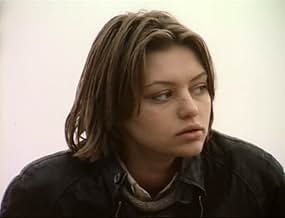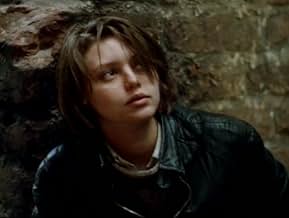Füge eine Handlung in deiner Sprache hinzuIn Kaliningrad two Lithuanian boys meet two Russian girls. They have difficulties in finding places where they can sleep together. But this is the only problem they do solve. All four justly... Alles lesenIn Kaliningrad two Lithuanian boys meet two Russian girls. They have difficulties in finding places where they can sleep together. But this is the only problem they do solve. All four justly feel miserable because their lives are meaningless (the recurrent dull and poorly kept ho... Alles lesenIn Kaliningrad two Lithuanian boys meet two Russian girls. They have difficulties in finding places where they can sleep together. But this is the only problem they do solve. All four justly feel miserable because their lives are meaningless (the recurrent dull and poorly kept house façades could well be taken as a comparative symbol). In addition, everyone is so abso... Alles lesen
- Regie
- Drehbuch
- Hauptbesetzung
- Auszeichnungen
- 3 Gewinne & 2 Nominierungen insgesamt
Empfohlene Bewertungen
The film is situated in Kaliningrad, the former Prussian city of Koningsberg, the city of the famous philosopher Immanuel Kant. Today the city is Russian territory, but seperated from the Russian mainland. It is enclosed by Lithuania, Poland and Belarus. Given this geography it is the ideal location to symbolize the confusion of the immediate post Soviet era.
The film is about two boys and two girls aimlessly wandering through the city for three days. The "story" has a clear resemblance with "Menschen am Sonntag" (1931, Robert Siodmak & Edgar Ulmer & Rochus Gliese) but is distinctly inferior in quality. I paid a lot of attention to the era in which the film is situated, because only with this in mind the film can be interpreted and (somewhat) appreciated.
Other films about the era after the implosion of the Soviet Union are: "Darkness in Tallin" (1993, Ilkka Järvi Laturi).
"In that land" (1998, Lidiya Bobrova).
Moreover to really understand a film such as "Lilya 4-ever" (2002, Lukas Moodysson) is is also necessary to understand the situation just after the Soviet Union has fallen apart.
In an earlier version of this review I wrote that the film has not aged well. Today (november 2024) I think the film is highly topical in helping to understand Poetin's Russia. The collapse from superpower to nearly developing country in a very short time has given the pride of the Russians a huge blow.
I cannot offhand think of a movie in terms of visual aesthetic that is more beautiful than Three Days. It's a film you have to give yourself up to, as if you're an oracle allowing a god to channel their voice through you. I chose to put in on the evening before Christmas Eve, a night I have to myself, where I can relax, before having to go see people on Christmas Day. It's predominantly a shades of brown movie, though ghostly white gets in there all the time (even grisaille), and blue here and there. The locations are all ruins that vary in level of decrepitude. The youngsters end up existing out of residences that are cave like and primal. At one point they are scattered in the ruins of a church, and it's as if pigeons had been scattered, a quite unbelievable scene.
As sad as these youths are, something more beautiful is happening for them than anything that has ever happened in my life. Sometimes it is better to cry than to live in the world, I certainly regret not having cried more in my life.
There is a juxtaposition throughout the movie between the four youths, and people who are yahooing or fornicating. Not everyone goes through the metanoia described in this movie! This is one to keep on watching over and again.
In this realm of experience Sharunas Bartas renders in Three Days, there is a beauty of surfaces and distances, an endless sense of moment, the space characters occupy before moving on, the way light immerses everything in its shifting and waning powers, manifesting a landscape apparently out of nothingness, a nothingness which seems to persist when place and beings are subsumed into the atmospheric field, endlessly holding our gaze. A deepening dimension of silence reveals a startling lucidity of forms and sounds, especially effective as seen and heard through distance. All of which tentatively define time as it arises, and a place which keeps taking place. Although our gaze continually moves between figure and background, our attention is occasionally suspended in moments of emotive mystery: Why is she suddenly laughing? Or crying? Thus Katerina Golubeva haunts us as well.
The conventional modes of narrative, dialogue and exposition used by popular forms of cinema have created a systemic refuge of meaning for us, heavily conditioning our belief that what passes as storytelling is actually a direct way into knowing who we are, rather than a continued shared desire to conform our behaviors predictably into acceptable cultures. Thus storytelling has become a highly cultivated way of transmitting un-truths. Bartas radically exposes this mythology of culture in creating his profoundly mysterious cinema, not because he withholds information from us, but simply because he suggests an impossibility of truly knowing others on deeper levels (an insight also registered in some films by Claire Denis and Chantal Akerman). Apparently unavailable are these private lives before us, their pain barely surfacing to negotiate an entropic numbness.
However, an ability (in fact the very invitation to the viewer) to bear witness, is quite important here. In the feeling of being present there, in a room with the woman and man, there is no sense of voyeurism merely because we are given access to their private moments: as they lay on the bed, fully clothed, without speaking, she holding him against herself, gently stroking his hair, his face hidden in her coat, the dance-hall music from across the way distant but audible, her tears visible as she begins to cry silently. What registers is highly unusual: instead of empathy because you might understand why she's crying (you actually might not), the moment involves being present to witness her distress, without even knowing why, and only because you have been given special permission to do so, which has become clear. Through this act of grace, Bartas allows us to bear witness to these lives without the need to "own" the experience through having one's subjectivity excercised; it enables a witnessing so eminently humanizing. In fact, it seems an ethical subversion of the usual effects of emotional pornography characteristic of so much common cinematic manipulation, wherein a typical excess of information "gets us going."
There are moments when these human figures we encounter almost emerge as full-fledged subjects, before disappearing again into their maintained silence. Mostly speechless, they drift along or meet up, drift together for a while, through rooms, into encounters without welcome or conclusion. The drifting itself evokes a wayward miasma: there seems to be nothing to do but gradually move, entering buildings through windows, turning around when gates are closed, living outside possibilities of comfort, standing here and there, standing some more before moving on again.
Yet the realm they inhabit and pass through - this supreme transience of presence, seemingly containing everything, full of subtle contingencies - becomes an aesthetic one unsurpassed by alienation, and one which has steadily encompassed our feeling, not just our witness. And so what is made available finally, one of the film's true gifts, is a newly possible vision, making one suspect: Is this after all nothing less than the life - of the whole world - which we are witnessing?
Kaliningrad makes the location of 'Trys dienos' (= Lituvanian for 'three days'). Director Bartas cleverly used its surviving massive German architecture as a setting for his very East European story. Thus making a special contrast.
The desolation of his plot also reflects the desolation of Kaliningrad: the town is Russian, but does not look Russian. The town is Russian, but cannot escape its German past. Its inhabitants tend to look westwards to Scandinavia, but are tied up eastwards to Moscow.
These ingredients make 'Trys dienos' attractive. Its picturing is adequate, its story & acting are no more than mediocre.
Wusstest du schon
- VerbindungenEdited into Geschichte(n) des Kinos: Le contrôle de l'univers (1999)
- SoundtracksLambada
Performed by 'Kaoma'
Top-Auswahl
Details
Zu dieser Seite beitragen


























